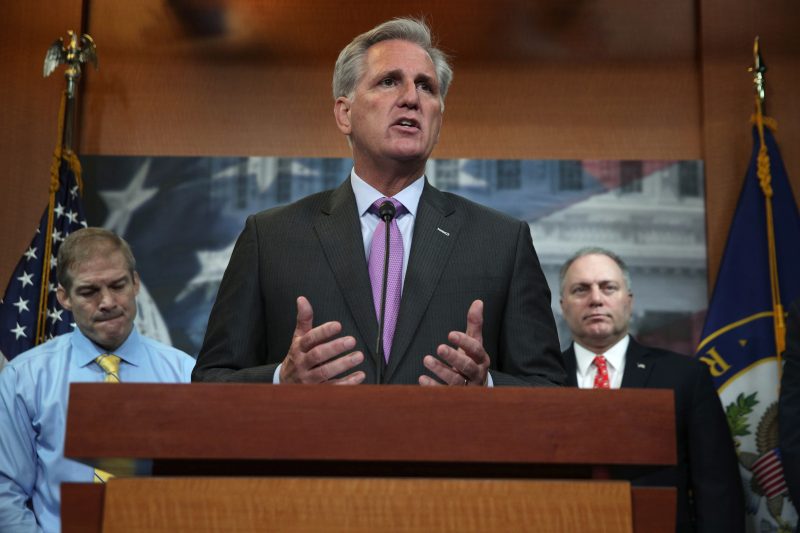Republicans could elect a new speaker of the House this week. Or they might not. And nobody is holding their breath.
“No one at this point is even remotely close to a majority,” Rep. Kat Cammack (R-Fla.) told The Washington Post on Tuesday about the race between House Majority Leader Steve Scalise (R-La.) and Rep. Jim Jordan (R-Ohio). “So I think that we’re not just going to be here for a couple extra days. My money says weeks.”
Sure enough, the GOP conference on Wednesday made Scalise its nominee by a narrow margin, setting up a floor battle that could go any number of ways. Some Jordan supporters say they’ll keep voting for him; some Republicans voted for neither man. And for now Scalise got the support of only about half of his conference.
If Cammack is right that this could take days or weeks, Republicans would only add to already-historic milestones resulting from their internal chaos.
But just how historic? Here’s a look at the numbers and historical facts.
Rep. Kevin McCarthy (R-Calif.) last week became the first speaker to be removed from office by a vote of the House.
Only once before had the House even voted on a so-called “motion to vacate,” in 1910. And only twice before had such a motion even been filed (the other being against GOP Speaker John A. Boehner last decade).
There is currently debate within the GOP about whether it will continue to allow one member to force such a vote. But unless it changes the rule, the GOP’s razor-thin majority and an unruly caucus of hard-right members make it entirely possible the motion against McCarthy won’t even be the only one this Congress.
That unprecedented ouster left the GOP speaker with an historically short tenure.
Technically, McCarthy’s 269 days in office is the third-shortest. But the other two don’t really compare.
Theodore Pomeroy served one day in 1869 between Schuyler Colfax leaving for the vice presidency and Pomeroy’s own retirement from Congress. And Michael C. Kerr served 258 days in 1875 before his death from tuberculosis — a condition he had contracted long prior.
The House has gone eight days without a speaker this month. (GOP Rep. Patrick T. McHenry of North Carolina serves as speaker pro tempore but is limited in his powers.) It has also gone 12 days without a speaker this session, when you include the four days it took to elect McCarthy.
That appears to be the longest we’ve gone without a speaker in more than a half-century; there was an 18-day gap in 1971.
But even that isn’t really the same thing. Throughout history, there have often been gaps because a speaker exited as a Congress concluded, and the new Congress didn’t convene (and elect a new speaker) right away. The 18-day gap in 1971 occurred because Congress convened rather late, on Jan. 21.
A better comparison would seem to be 1961, when John McCormack served as speaker pro tempore for 28 days while Congress was in session, as then-Speaker Sam Rayburn was ailing (and would soon die). McCormack was then elected speaker when Congress reconvened in 1962.
If this takes 16 more days, as Cammack suggests it could, we’d surpass 1961. Of course, back then there was at least a titular speaker.
Republicans in January already set a post-Civil War high for the number of ballots it took to elect McCarthy: 15. It was only the second time since then that an election even required multiple ballots. It was also the fifth most in history.
Should the next election take seven ballots, this Congress will have moved into a tie for fourth place when it comes to how many times it voted on a new speaker.
(Climbing the list beyond that would indeed take several days or weeks. Third place is 44 ballots. Second is 63. And first place is 133 ballots between 1855 and 1856 — surely something to shoot for.)
The GOP’s failure to elect a speaker could soon lead to a rather weird distinction: Democratic House Minority Leader Hakeem Jeffries (N.Y.) might set a post-1913 record for most total votes for speaker, despite never winning the job and having received only a single vote before this year.
Jeffries received 3,179 votes for speaker across the 15 votes in January as Democrats remained united in their support for him. That was actually more than McCarthy’s 3,072, because Jeffries got more votes than McCarthy until the 12th ballot. (Philip Bump ran down some of these numbers while the January balloting was underway.)
McCarthy has still received the most votes since 1913, by virtue of the 15 ballots and his totals in earlier speaker elections when Republicans were in the minority. He’s at 3,474 votes, while Jeffries has 3,180 (he got one vote in 2021).
Both surpassed the previous post-1913 record-holder, Rayburn, who was on the ballot for 12 speaker elections and won 10 of them.
But if there’s more than one ballot to pick the new speaker, Jeffries will in all likelihood have secured the most votes for speaker over the past 110 years — reinforcing the GOP’s discord and how unusual all of this has been.



























